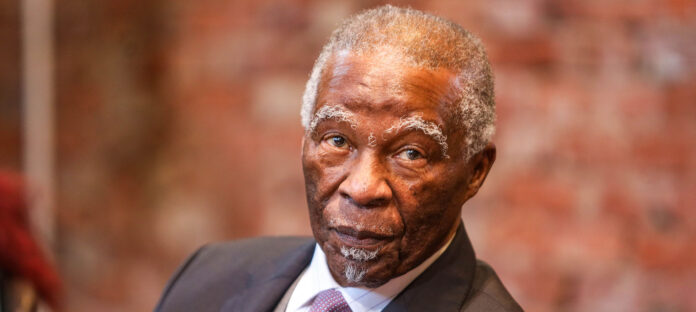Former President Thabo Mbeki has launched a blistering critique of South Africa’s intelligentsia on his new African Renaissance podcast, declaring that the National Development Plan (NDP) is “not a plan, it’s a vision.”
Coming from the man who initiated the NDP through the National Planning Commission before his 2008 removal, this represents either remarkable self-awareness or stunning historical amnesia. The irony cuts deep.
Mbeki, alongside his finance minister Trevor Manuel, championed the NDP as South Africa’s blueprint for eliminating poverty and reducing inequality by 2030. Now, with the 2030 deadline looming and most targets catastrophically missed, he distances himself from the framework his administration birthed.
Unemployment hasn’t dropped to the promised 6% but hovers above 30%. The Gini coefficient remains stubbornly high at 0.63, far from the target of 0.60. Those 11-million jobs? A fantasy.
Yet, Mbeki’s critique raises uncomfortable questions that transcend political point-scoring. If the NDP truly lacks actionable plans, who bears responsibility?
The intelligentsia he now admonishes includes the very academics, economists and policy experts his government consulted. Did they fail to translate vision into implementable strategy, or did successive governments simply lack the political will to execute the plan?
The EFF’s captured this dilemma brilliantly during a 2023 parliamentary briefing, noting that calling the NDP a plan while it lacked milestones and action plans essentially renders it meaningless. But here’s the rub: Mbeki himself told us in 2013 that the NDP “offers a long-term perspective” and “defines a desired destination”.
That sounds distinctly like vision, not prescription.
What we’re witnessing is a recurrent malady, where founding fathers refuse to retire quietly, instead returning to critique their own legacies while positioning themselves as prophets ignored.
Mbeki joins former president Jacob Zuma in this toxic theatre, both men at 83 refusing to accept that their time has passed. The African Renaissance podcast, hosted by Dr Mbuyiseni Ndlozi, becomes another platform for revisionism, where the golden years of 1994 to 2009 are airbrushed clean of Aids denialism, quiet diplomacy failures in Zimbabwe, and the neoliberal policies that Cosatu railed against.
But Mbeki’s challenge to the intelligentsia demands serious engagement. Are South Africa’s academics, researchers, and policy experts sufficiently engaged with implementation?
Do they possess the practical nous to transform theoretical frameworks into workable programmes? Or have they become complicit in a system that rewards published papers over tangible transformation, a criticism increasingly levelled at universities prioritizing citation metrics over societal impact?
Mbeki once declared that “Africa’s renewal demands that her intelligentsia must immerse itself in the titanic struggle to end poverty, ignorance, disease and backwardness”. Noble words.
Yet, his own track record shows how easily vision dissolves into rhetoric when confronted with the messy realities of governance, coalition politics and constrained budgets.
Perhaps the most pressing question isn’t whether the NDP is a plan or a vision. It’s whether the political class, including its elder statesmen, can move beyond performative critique to genuine accountability. The country doesn’t need another podcast dissecting past glories. It needs leaders who acknowledge their failures, learn from them, and empower the next generation rather than endlessly relitigating yesterday’s battles.
Mbeki is right that the intelligentsia must do better. But intellectuals without implementers, visionaries without executors, and plans without political courage all lead to the same destination: unfulfilled promises and a nation still waiting for its renaissance.





